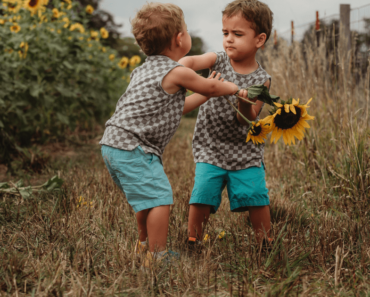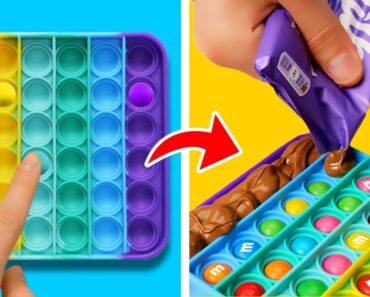Jesica Rysynski’s toddler was having constant tantrums. Even joyous events like Christmas celebrations and birthday parties could enrage her daughter Amalia.
“Amalia would get angry—very, very, very angry,” says the mom from Peterborough, Ont. “I thought she was spirited or quick-tempered until I realized that she’s not angry; something is upsetting her.”
At parties, Amalia raged as people sang “Happy Birthday” because the singing was too loud. At Christmas, she fumed because opening gifts was too exciting.
Amalia was using anger to escape overwhelming situations. Controlling her environment became the key to managing her behaviour.
“I always look for the root cause so I can get in front of it.” says Rysynski, explaining how she anticipated circumstances that might overwhelm her daughter. “I would tell her, ‘If you get upset, come to Mommy for a hug. I’ll take you out.’”
Amalia is the youngest of Rysynski’s children. Her oldest child has a sensory processing disorder, and another has ADD. By the time Amalia was born, Rysynski had learned to handle behaviour by understanding the reasons behind it.
Toddlers are tough, but there are proven ways to decode your kid’s actions. Applied behaviour analysis (ABA) uses science to interpret and manage behaviour and understanding these basic principles can guide you through these troublesome toddler years.
Why toddlers act out
ABA defines four functions, or reasons, that drive a toddler’s actions. The functions are sensory, escape, attention and tangible.
Sensory: Sensory behaviour is caused by needing to feel a certain sensation, like when toddlers pick their nose, itch a bug bite or suck their thumb.
Escape: Escape behaviours are used to avoid tasks or exit a situation. Toddlers will scream to leave the grocery store, ask for a snack to delay bedtime or cry to escape car rides.
Attention: Attention behaviours seek recognition from a parent, friend or other person. Sometimes, any attention satisfies a toddler, even negative attention. They whine to distract you from work, paint furniture to display their artistic skills or bite your arm to get you off the phone.
Tangible: Tangible behaviour wants to gain access to an object or activity, like when toddlers misbehave to get a tablet or jump off furniture to score a trip to the playground.
“Every single human behaviour falls into one of those four categories,” says Rachel Tullis, a board-certified behaviour analyst – doctoral in Atlanta Georgia, who develops education programs for children with disabilities.
“Human behaviour is pretty complex, so often the behaviour will have multiple functions,” says Tullis. “The terms are less important than figuring out what your child needs at that moment.”
For example, a toddler might cry over a broken granola bar because she wants a new one, or she might be fussy for several reasons. Perhaps she wants a waffle instead (tangible), or she isn’t hungry (escape), or she wants to sit on mom’s lap while she eats (attention), or her tummy hurts (sensory).
Figuring out the function behind toddler behaviour is tricky. The best clue lies in the events that happen right after the behaviour. Perhaps your toddler throws a fit every time you walk into a store. What calms them down? Do you always leave the store when they throw a fit? Do you give them a toy or a treat? Do you entertain them with lots of attention? Once you see a pattern of behaviour and a certain result, you can help your toddler handle the situation in more positive ways.
What’s my toddler saying?
When toddlers can’t express their thoughts and feelings, they get frustrated and their behaviour slides downhill. You can help by teaching them to ask for items and share their emotions.
“The more you practice communication when things are happy and calm, the more likely they are to use it when they really need it,” says Tullis.
To work on this skill, create situations that will encourage your toddler to talk. You can give them a small bite of their favourite food and then model asking for “more.” Or, you can do a fun activity with them, stop the activity, and then model saying “again.” Once you have modelled for them several times, you can start waiting for them to try saying the word.
“Even if they don’t say the word correctly, immediately reward any attempt at communication,” says Tullis. “Give them access to the item while saying, ‘I hear you asking for the stuffy, here it is!’”
If your toddler’s speech is limited, you can try nonverbal communication. Teaching your toddler eight essential signs can reduce tantrums. Begin with functional words like “play,” “all done,” and “pick me up.” Although kids can sign as early as 8 months old, starting later can still be effective for children who struggle with speech.
How to manage behaviour
Knowing your toddler’s needs will help you manage their behaviour. Since every challenge is unique, keep an open mind and try different tactics.
Be prepared
Before going into a tough situation, set up for success. Talk to your child about the environment and expectations. For example, before visiting a restaurant you can discuss quiet voices and waiting at the table. Show them how to ask for breaks, activities, or attention.
Go beyond diaper bag basics when you pack for an excursion. Bring extra items to keep your toddler comfy like noise cancelling headphones for loud places, a mini fan for hot days and fidget toys for car rides.
Set rewards in advance
Even with the best preparation, kids can get hysterical. The fast fix is to hand over a treat, but that teaches them to cry for a prize. Instead, set up rewards in advance. This encourages good behaviour. To keep your kid focused, you can give tokens along the way. For instance, if you have a busy day, give your toddler a sticker after each task to show their progress.
Create boundaries
Establish simple boundaries and stay consistent. Toddlers will try to negotiate; it’s important not to bend. If your toddler refuses a bath, remind them of the boundary: “we take a bath every day.” Then, consider the functions behind their behaviour. Toddlers might fear hair washing, crave more playtime, or get bored in the tub. You can make your kid comfortable once you know their needs but stay firm on the boundary.
Validate feelings and offer replacement behaviours
Toddlers want you to respect their emotions. Hearing you say, “I see you are mad” or “It looks like you’re sad” helps them to understand, and it validates their feelings, which is the first step towards controlling their reactions.
Toddlers don’t always express themselves in acceptable ways. When this happens, you can teach them a replacement behaviour, or a better behaviour, instead. Perhaps another child snatches a toy from your kid. Toddlers might hit or throw things to feel better. Replace this harmful behaviour by offering choices like squeezing their hands or running in place.
Modelling good communication and behaviour prepares your child for tough situations. If you are waiting at a restaurant, try saying, “I feel bored because we are waiting for our food. Let’s tell stories.” Be sure to say your emotion aloud and give a positive behaviour will help your child handle the emotion.
We all have bad days. Even if you become a toddler expert, you will still have tear-your-hair-out moments. Despite your best efforts, occasionally you will give in or ignore a problem. The key is to do your best most of the time.
“If you’re doing your best to get challenging behaviour under control 80% of the time, the 20% of the time that it’s not happening is not a big deal,” says Tullis. “Teaching communication, independent waiting skills and any other positive behaviours is going to be beneficial in the long run.”

































